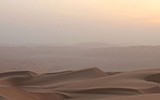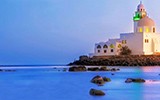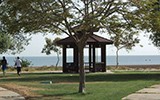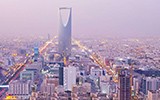Moving to Riyadh as an international student can be challenging due to cultural contrasts. However, with proper research ...
Living in Saudi Arabia guide for expats
All the information you need to relocate and live in Saudi Arabia.
Our selection of articles for expatriation in Saudi Arabia
Jubail is a city in the Eastern province of Saudi Arabia with a population of over 680,000 people. It is also home to the largest ...
As the capital city of Saudi Arabia, Riyadh is one of the biggest urban communities in the country and is home to a large number ...
Working in Riyadh can come with many benefits: whether you are a young professional or expert in your field. As Saudi ...
Saudi Arabia can be a challenging destination for women. As a strict Islamic country, Saudi Arabia imposes a lot of restrictions ...
As an expat in a new environment, life can be full of surprises. Unfortunately, sometimes, these surprises can be unpleasant. In ...
While having a child in a foreign country may seem quite overwhelming at first, with the right research and preparation, your ...
If there was one adjective that could describe dating in Saudi Arabia, it would be the word 'discreet'. Dating in Saudi ...
If you are coming to Saudi Arabia with children and plan to work full time, you may want to look into getting some help ...
Saudi Arabia is a country that holds marriage and family as one of its core values. It is a privilege to get married and a huge ...
To become a resident in Saudi Arabia, you will need to apply for a residence permit, also known as the Iqama. The procedure for ...
Value Added Tax was first introduced in Saudi Arabia in 2018 at the rate of 5%. As of July 2020, it has been increased to 15%.
When reading about looking for work in Saudi Arabia, you will probably come across the term “saudization”. While this ...
Jeddah is the most diverse city in Saudi Arabia. It is home to 3,4 million people and to the largest multicultural expatriate ...
Dammam, the Eastern province's capital city, is a very dynamic city in Saudi Arabia, almost as much as Khobar. It is the 6th ...
About Saudi Arabia
Saudi Arabia is deemed to be an absolute monarchy, founded in 1744. The country has been one of the Middle-East region's major strategic economic and political players, being a direct rival to Iran. Stretching over some 2,149,690 km², covering 80% of the Arabian Peninsula, it is considered to be the region's biggest country. Riyadh is Saudi Arabia's capital city while a few other major cities include Jeddah, and Islam holiest cities Mecca, and Medina.
Geography of Saudi Arabia
Geographically, the country is taking the most of central and northern Arabian peninsula, sharing borders with Jordan, Iraq and Kuwait, the Persian Gulf, Qatar, UAE and Oman, Yemen and the Gulf of Aqaba, on the Red Sea. It is misunderstood by many, that the Kingdom consists only of desert sands. The nature in Saudi Arabia varies from the largest desert on the Peninsula - Rub AL - Khali, or Empty Quarter, through the mountains of Abha, Asir region, the rose valleys of Taif, the shallow waters of the Persian Gulf and the rich coral and marine life of the Red Sea.
The population of Saudi Arabia
Saudi Arabia is home to 34,81 million inhabitants, according to the World bank data for early 2020. The population is overwhelmingly young, with roughly 70% of the citizens below 30yrs old. The population also includes a large expat community of nearly 10 million foreigners who now call Saudi Arabia home.
Language of Saudi Arabia
The official language of Saudi Arabia is Arabic, although English is widely used and spoken by most of the population. Almost all official signage and businesses offer both Arabic and English translations and services, but in your daily life, Arabic would be really helpful.
Law in Saudi Arabia
Saudi Arabia's society is made up mostly of Sunni Muslims, and a marginal Shia Muslim population. The country is ruled by Islamic Law (Sharia) and everyone in the Kingdom is obliged to follow the rules and customs. Sharia Law is derived from the principles of the Islamic religion and is closely tied to the Quran, the holy book for Muslims. Sharia Law governs all daily activities and major issues such as family rights, criminal law, and businesses.
Currency in Saudi Arabia
Saudi Arabia's currency is the Saudi Arabian Riyal (SAR).
Petroleum and economy in Saudi Arabia
Petroleum is undeniably one of Saudi Arabia 's key aspects. It is a fundamental part of the Gross Domestic Product (GDP). With the tendency of falling oil prices, the Kingdom is seeking to diversify its economy sources. This is, indeed, the main idea behind the Vision 2030 initiative.
Saudi Arabia has built up a solid reputation worldwide in terms of its economy throughout the years. Nowadays, the country is putting efforts to overcome unemployment and the fall of the oil prices. The forecast of the International Monetary Fund for 2020 is for 2% growth. Regardless the oil market issues, and the internal struggles, its economy has developed a dynamic services sector, consisting of religious tourism, banking, finance, insurance, trade, hotels, restaurants, and government services. As regards to the secondary sector, it involves mining, construction, and manufacturing. The primary sector makes a 2% contribution to the country's GDP through fishing and agriculture, among others. This should give you an idea of the fields in which you are more likely to find job opportunities if you wish to settle and work there. Though, probably, the most wanted employer is the state oil company - Saudi Aramco, a small part of which was just recently listed, during Initial Public Offering on the domestic stock exchange, considered the world`s largest IPO so far.
Politics in Saudi Arabia
Being an absolute monarchy, Saudi Arabia is led by a king, who has the final authority as Head of the Government and State. The ruling dynasty are the descendants of Muhammad bin Saud, the Founder of the First Saudi state, who`s tribe derives from the Najde region and the power has always been transmitted by heredity. Note that this system is known as dynastic tribalism. In fact, Saudi Arabia does not carry out elections, hence the total absence of political parties. Indeed, those who have ventured in this field have been qualified as illegal groups. The current monarch of the country is King Salman bin Abdulaziz Al Saud, with the de facto ruler - Crown Prince Mohammad bin Salman bin Abdulaziz Al Saud. The Kingdom is the sole Arab country that is part of the G20 organisation and assumed the presidency of the forum for 2020. It is part of the GCC, the Organisation of Islamic Cooperation and OPEC, the Arab League, and have just launched New Red Sea Arab - African countries alliance.
The climate in Saudi Arabia
There are three climatic zones in the Kingdom - desert, almost everywhere, steppe, along the western highlands and a small area of humid and mild temperature conditions, with long summers with very hot temperatures during the day and relatively cold at dusk. In summer, you should expect temperatures rising up to 50°C. However, given the size of the country, the west side has a subtropical climate with high humidity in the summer and moderate temperatures in winter. You are also likely to have rainfall over the central area, including in Mecca and Jeddah. In short, you will often feel hot in Saudi Arabia.
Immigration in Saudi Arabia
Expatriation requires appropriate reflection and planning, regardless of the destination. Culture shock is expected of any new destination, but with a positive and open mind, it can be very rewarding.
When moving to Saudi Arabia, it is important to understand the country's cultural and religious subtleties. If you manage to overcome this challenge, Saudi Arabia can be an ideal and attractive destination for expatriation.
In spite of all paradoxes, Saudi Arabia sails between old traditions and modernism. Millions of foreigners have decided to live and work within the monarchy so as to benefit from its economic prosperity and various opportunities and benefits attached.
According to many Expat.com members who have posted on the forum, their decision to settle in Saudi Arabia has been motivated by the following:
- Tax-free salary
- Learning Arabic
- Low cost of living
- Positive work-life balance
- More free time (for recreational activities/ family time)
- Beautiful environment (landscapes, terrains, coasts)
- Experiencing a new and different culture and heritage
- Warm temperatures (despite extremes)
- Higher salaries & incentives
Latest housing offers in Saudi Arabia
Latest job offers in Saudi Arabia















